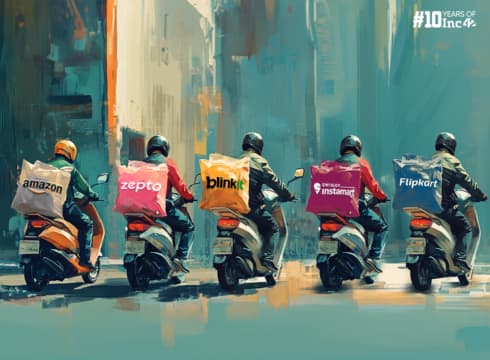According to a letter revealed by Reuters, India's largest group of retail distributors asked the antitrust authority on October 18 to investigate quick commerce firms for engaging in predatory pricing—offering deep discounts and selling below cost to attract customers
The letter urged the Competition Commission of India (CCI) to implement protective measures for traditional distributors and small retailers to safeguard their interests
It is pertinent to note that over the last six months, quick commerce players have expanded operations and diversified their catalogue to meet growing consumer demand
Inc42 Daily Brief
Stay Ahead With Daily News & Analysis on India’s Tech & Startup Economy
The All India Consumer Products Distributors Federation (AICPDF), which represents 400,000 retail distributors of major companies like Nestle and Hindustan Unilever, has reportedly called on the antitrust authority to investigate Zomato’s Blinkit, Swiggy, and Zepto for alleged predatory pricing.
According to a letter revealed by Reuters, India’s largest group of retail distributors asked the antitrust authority on October 18 to investigate quick commerce firms for engaging in predatory pricing—offering deep discounts and selling below cost to attract customers.
The letter stated that several consumer goods companies were bypassing traditional salespeople, who have been delivering orders to shops for decades, by dealing directly with quick commerce firms to expand their reach.
“Such practices make it impossible for traditional retailers to compete or survive,” the letter added.
The letter urged the Competition Commission of India (CCI) to implement protective measures for traditional distributors and small retailers to safeguard their interests.
Quick commerce is the latest shopping trend in India, offering ultra-fast deliveries with companies like Blinkit, Swiggy, and Zepto promising delivery times of often within 10 to 30 minutes for items ranging from groceries to electronics. This rapid service is reshaping consumer habits and challenging ecommerce giants like Amazon.
These companies achieve rapid delivery times by using local warehouses or strategically placed dark stores in urban areas, where orders are picked, packed, and dispatched quickly. Customers simply place orders through an app, and the nearest facility handles the process, enabling delivery drivers to transport goods to their doorsteps in under an hour.
It is pertinent to note that over the last six months, quick commerce players have expanded operations and diversified their catalogue to meet growing consumer demand. Pretty much all platforms including Swiggy Instamart and the new Flipkart Minutes have entered into categories such as electronics, beauty, pet care, toys and smaller household appliances.
In the case of Blinkit, the additions resulted in gross order value (GOV) surging 130% to INR 4,923 Cr in Q1 FY25 from INR 2,140 Cr in the corresponding quarter last year. Sequentially, it increased by 22.2% from INR 4,027 Cr in Q4 FY24.
Currently, Blinkit operates 639 dark stores across the country, with the average daily GOV per store rising to INR 10 Lakh, compared to INR 6 Lakh from 383 stores previously. The company aims to scale the number of dark stores to 2,000 by the end of 2026 while maintaining profitability.
{{#name}}{{name}}{{/name}}{{^name}}-{{/name}}
{{#description}}{{description}}...{{/description}}{{^description}}-{{/description}}
Note: We at Inc42 take our ethics very seriously. More information about it can be found here.


